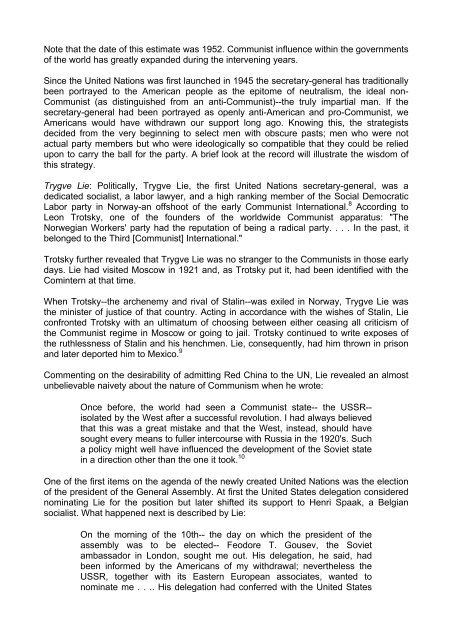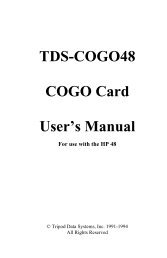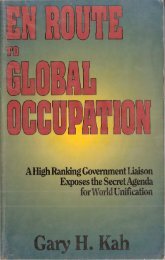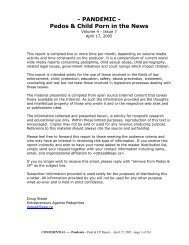G. Edward Griffin - The Fearful Master - PDF Archive
G. Edward Griffin - The Fearful Master - PDF Archive
G. Edward Griffin - The Fearful Master - PDF Archive
You also want an ePaper? Increase the reach of your titles
YUMPU automatically turns print PDFs into web optimized ePapers that Google loves.
Note that the date of this estimate was 1952. Communist influence within the governments<br />
of the world has greatly expanded during the intervening years.<br />
Since the United Nations was first launched in 1945 the secretary-general has traditionally<br />
been portrayed to the American people as the epitome of neutralism, the ideal non-<br />
Communist (as distinguished from an anti-Communist)--the truly impartial man. If the<br />
secretary-general had been portrayed as openly anti-American and pro-Communist, we<br />
Americans would have withdrawn our support long ago. Knowing this, the strategists<br />
decided from the very beginning to select men with obscure pasts; men who were not<br />
actual party members but who were ideologically so compatible that they could be relied<br />
upon to carry the ball for the party. A brief look at the record will illustrate the wisdom of<br />
this strategy.<br />
Trygve Lie: Politically, Trygve Lie, the first United Nations secretary-general, was a<br />
dedicated socialist, a labor lawyer, and a high ranking member of the Social Democratic<br />
Labor party in Norway-an offshoot of the early Communist International. 8 According to<br />
Leon Trotsky, one of the founders of the worldwide Communist apparatus: "<strong>The</strong><br />
Norwegian Workers' party had the reputation of being a radical party. . . . In the past, it<br />
belonged to the Third [Communist] International."<br />
Trotsky further revealed that Trygve Lie was no stranger to the Communists in those early<br />
days. Lie had visited Moscow in 1921 and, as Trotsky put it, had been identified with the<br />
Comintern at that time.<br />
When Trotsky--the archenemy and rival of Stalin--was exiled in Norway, Trygve Lie was<br />
the minister of justice of that country. Acting in accordance with the wishes of Stalin, Lie<br />
confronted Trotsky with an ultimatum of choosing between either ceasing all criticism of<br />
the Communist regime in Moscow or going to jail. Trotsky continued to write exposes of<br />
the ruthlessness of Stalin and his henchmen. Lie, consequently, had him thrown in prison<br />
and later deported him to Mexico. 9<br />
Commenting on the desirability of admitting Red China to the UN, Lie revealed an almost<br />
unbelievable naivety about the nature of Communism when he wrote:<br />
Once before, the world had seen a Communist state-- the USSR--<br />
isolated by the West after a successful revolution. I had always believed<br />
that this was a great mistake and that the West, instead, should have<br />
sought every means to fuller intercourse with Russia in the 1920's. Such<br />
a policy might well have influenced the development of the Soviet state<br />
in a direction other than the one it took. 10<br />
One of the first items on the agenda of the newly created United Nations was the election<br />
of the president of the General Assembly. At first the United States delegation considered<br />
nominating Lie for the position but later shifted its support to Henri Spaak, a Belgian<br />
socialist. What happened next is described by Lie:<br />
On the morning of the 10th-- the day on which the president of the<br />
assembly was to be elected-- Feodore T. Gousev, the Soviet<br />
ambassador in London, sought me out. His delegation, he said, had<br />
been informed by the Americans of my withdrawal; nevertheless the<br />
USSR, together with its Eastern European associates, wanted to<br />
nominate me . . .. His delegation had conferred with the United States



![Robert T McQuaid [rtmq@stn.net] Sent: Friday, October 29, 2004 12 ...](https://img.yumpu.com/51070071/1/190x245/robert-t-mcquaid-rtmqstnnet-sent-friday-october-29-2004-12-.jpg?quality=85)







